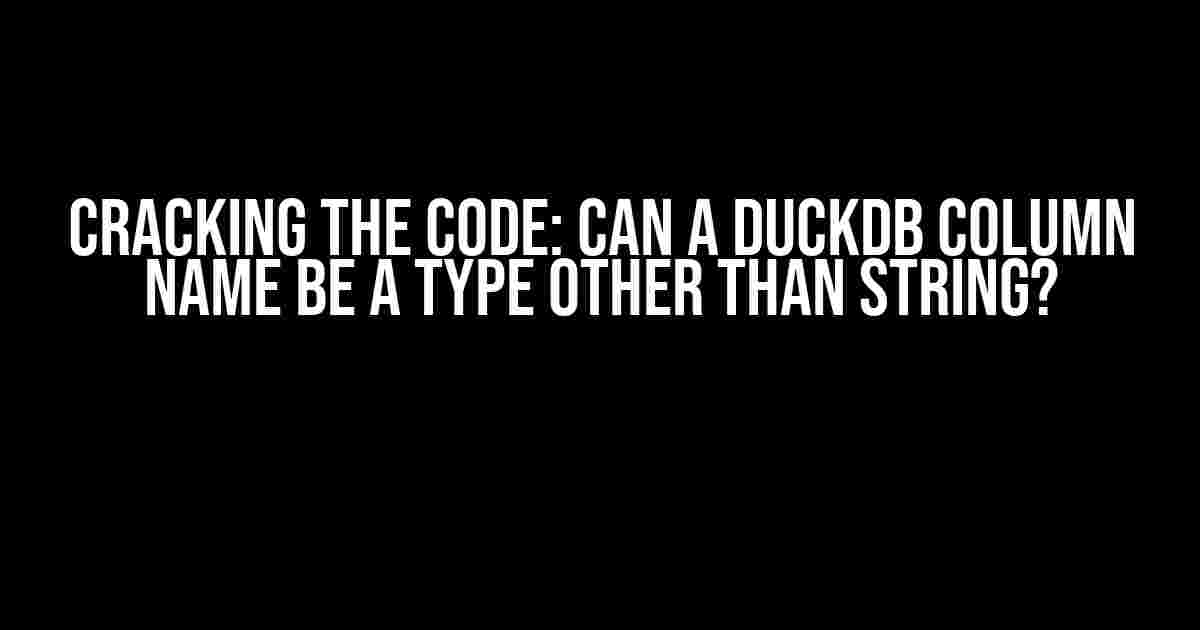As we dive into the world of DuckDB, a popular open-source column-store database, the age-old question resurfaces: Can a column name be a type other than string? It’s a legitimate inquiry, especially for those who’ve worked with other database systems. The answer, however, might surprise you. In this article, we’ll explore the possibilities, limitations, and creative workarounds to help you master DuckDB column naming conventions.
What are the Default Column Name Types in DuckDB?
By default, DuckDB column names are strings. Yes, you read that right! When you create a table in DuckDB, the column names are automatically treated as strings. This means you can use quotes (either single quotes or double quotes) to enclose the column name, making it a string literal.
CREATE TABLE my_table (
"column_1" INTEGER,
'column_2' VARCHAR,
column_3 DECIMAL(10, 2)
);In the example above, all three column names – `column_1`, `column_2`, and `column_3` – are treated as strings. The quotes around `column_1` and `column_2` explicitly define them as strings, while `column_3` is implicitly treated as a string due to the lack of quotes.
But What About Other Data Types?
Now, you might be wondering, “What about integers, floats, or other data types as column names?” Unfortunately, DuckDB doesn’t allow column names to be directly of other data types. The reason is that column names are used to identify and reference columns, and strings are the most natural fit for this purpose.
That being said, there are some creative workarounds to achieve similar results, which we’ll explore later in this article.
Workarounds for Non-String Column Names
While you can’t directly use non-string data types as column names, there are a few clever ways to simulate this behavior:
1. Using Aliases
One approach is to create an alias for your column using the `AS` keyword. This allows you to assign a column a temporary name, which can be of any data type.
SELECT 1 AS my_integer_alias, 'hello' AS my_string_alias;
In this example, `my_integer_alias` and `my_string_alias` become temporary names for the columns, which can be used in subsequent queries. Note that these aliases are only valid within the scope of the current query.
2. Using Derived Tables
Another method involves creating a derived table, where you can assign column names of your choice. Derived tables are temporary result sets that can be used as tables in subsequent queries.
WITH my_derived_table AS (
SELECT 1 AS my_integer_column, 'hello' AS my_string_column
)
SELECT * FROM my_derived_table;
In this example, the derived table `my_derived_table` has two columns, `my_integer_column` and `my_string_column`, with data types integer and string, respectively.
3. Encoding Non-String Values as Strings
If you need to store non-string values as column names, you can encode them as strings using a mechanism like Base64 or hexadecimal encoding. This allows you to store the encoded value as a string column name, which can then be decoded when needed.
CREATE TABLE encoded_columns (
encoded_integer VARCHAR,
encoded_float VARCHAR
);
INSERT INTO encoded_columns (encoded_integer, encoded_float)
VALUES ('AQID', 'AQIDBA==');
-- To decode the values:
SELECT decode(encoded_integer, 'base64') AS decoded_integer,
decode(encoded_float, 'base64') AS decoded_float
FROM encoded_columns;
In this example, the `encoded_integer` and `encoded_float` columns store the encoded values as strings. When you need to use these values, you can decode them using the `decode()` function.
Conclusion
In conclusion, while DuckDB column names are inherently strings, there are creative workarounds to achieve similar results using aliases, derived tables, and encoding non-string values as strings. By leveraging these techniques, you can effectively use non-string data types as column names, even if it’s not directly supported by DuckDB.
Remember, the key to mastering DuckDB is understanding its strengths and limitations. By exploring these workarounds, you’ll become proficient in handling complex scenarios and manipulating data with ease.
| Workaround | Description |
|---|---|
| Aliases | Assign a temporary name to a column using the AS keyword. |
| Derived Tables | Create a temporary result set with custom column names. |
| Encoding Non-String Values | Store non-string values as strings using encoding mechanisms like Base64 or hexadecimal. |
Now that you’ve cracked the code, go ahead and experiment with these workarounds in your DuckDB projects. Remember to share your experiences and insights in the comments below!
Frequently Asked Question
Get the scoop on DuckDB column names – can they be anything other than strings?
Can a DuckDB column name be an integer?
Nope! In DuckDB, column names must be strings. You can’t use an integer as a column name, even if it makes sense in your specific use case.
What about using a float as a column name – is that allowed?
Negative! DuckDB column names must be strings, which means no floats, no integers, no booleans… you get the idea!
Can I use a datetime object as a DuckDB column name?
Nope, that’s not possible either! While datetime objects are super useful, they’re not allowed as column names in DuckDB. Stick to strings, friend!
What if I want to use a null value as a column name – can I do that?
Ha! Nice try, but no way! Null values aren’t allowed as column names in DuckDB. You need a good ol’ string to give your column a name.
Why do DuckDB column names have to be strings, anyway?
It’s just the way DuckDB is designed, my friend! The creators of DuckDB chose to make column names strings to keep things simple and consistent. Plus, strings are easy to work with and make it easy to identify and reference columns.
